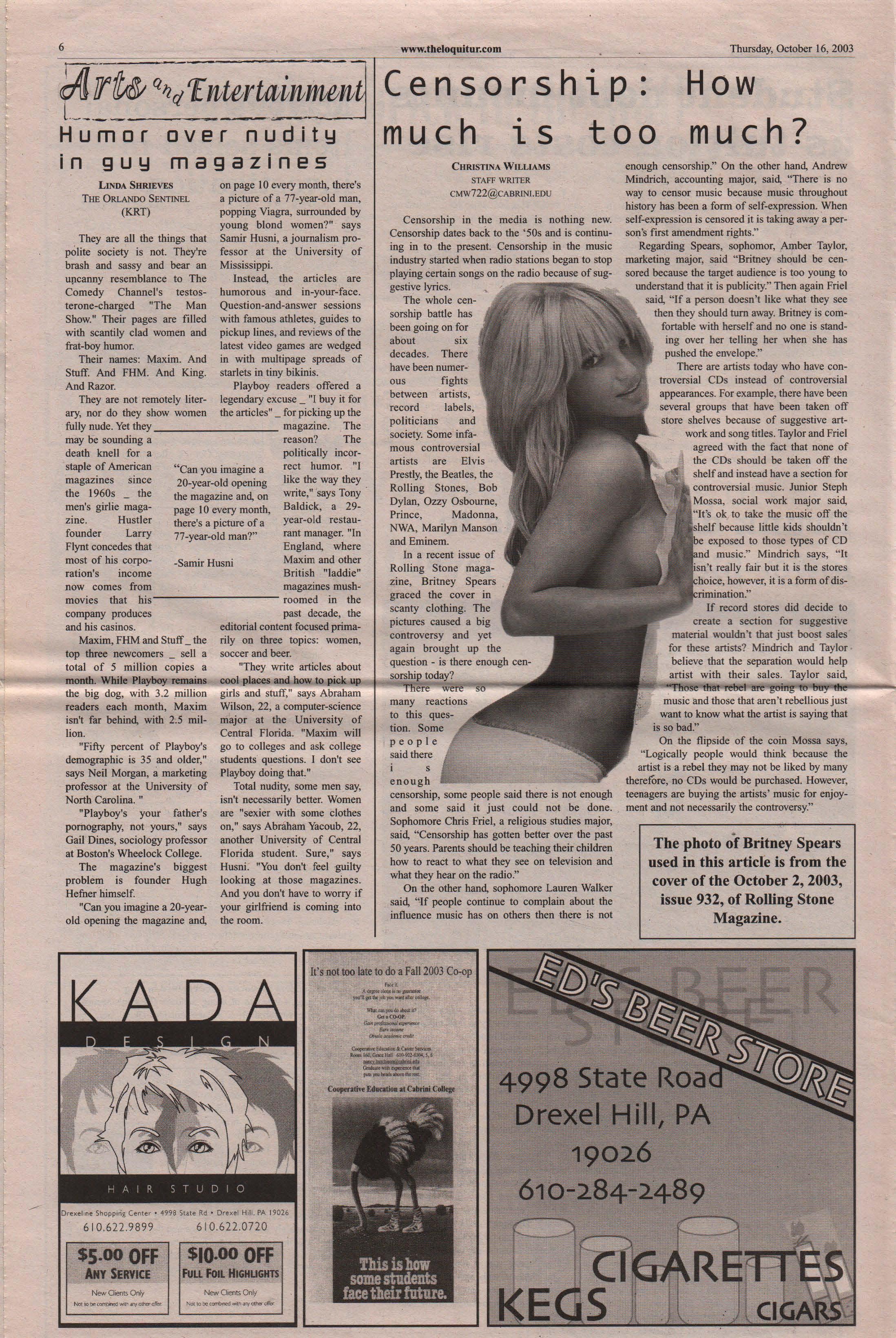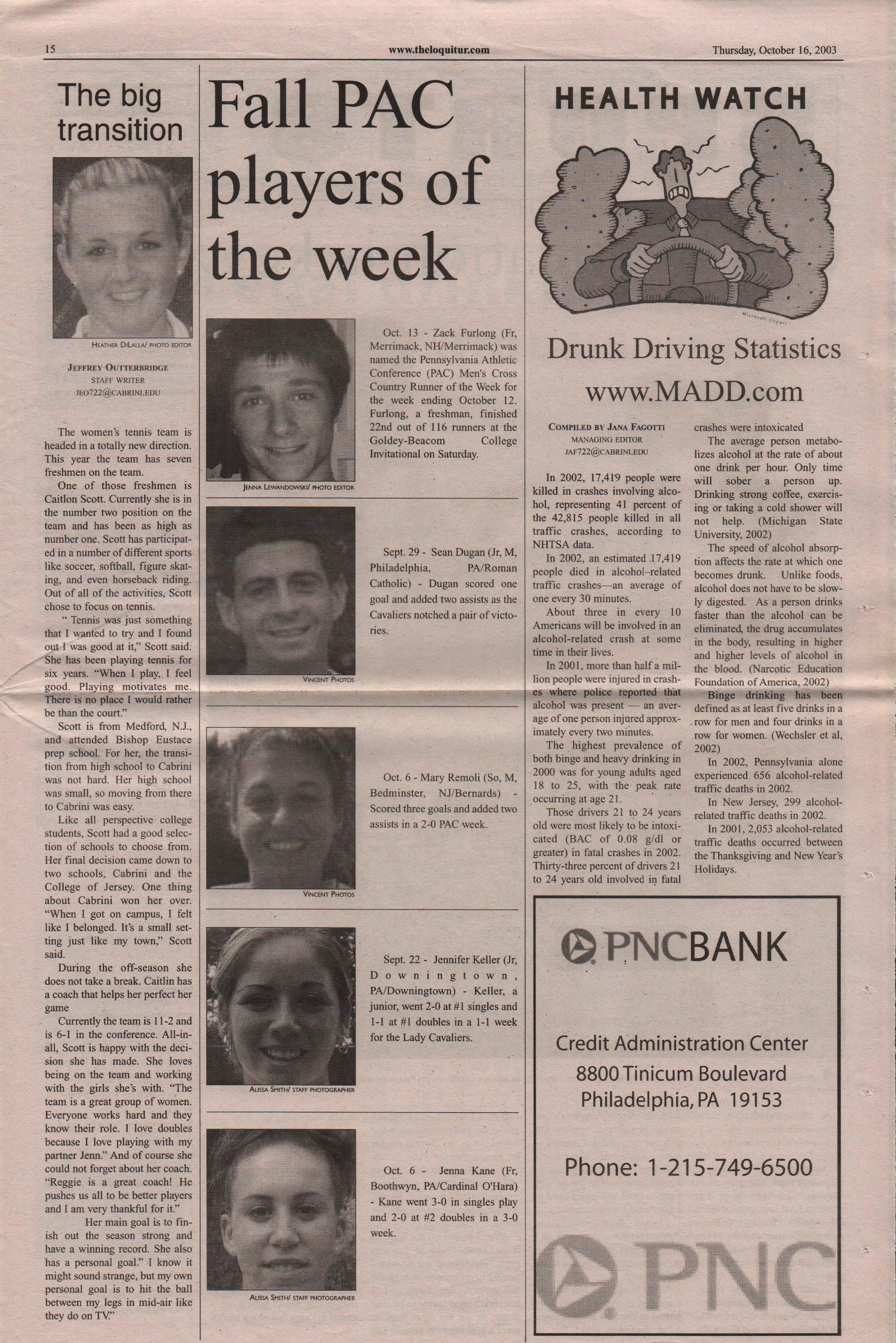
5 minute read
over-Sox·-:·Athletes:deal for3-2 senes lead
LMR722@CABRINI.EDU targeting athletes;' said Angela
"I think they're snobby," says Jim Ross a junior Graphic Design major. This is just one of the many opinions about athletes here on Cabrini's campus. There are often assumptions that the athletes are treated differently than their non-athletic counterparts. Being that Cabrini is a small school, it is evident that athletes stand out more so than at big universities. Do they receive preferential treatment or are they at a disadvantage?
Advertisement
The student handbook speci- • fies that if an athlete is subject to academic probation they may not participate in sports activi_tiesand that, just as any other student, they will be dismissed after that semester if unable to increase their GPA. This year, during Family Weekend, the team was awarded with having the most improved GPA of all the sports teams. The women went from a team averaged 2.7 to a 3.33 GPA since last year.
Templin, a Psychology major who plays softball. "They used to check our bags that were filled with sports equipment when going into the dorms," Templin said. Students such as Kristan Bush, a junior Human Resources Management major, does not find as much bias in the system. "They get in trouble just like anyone else does," Bush said.
"We don't go looking athletes," Charlie Schaffner, the Director of Public Safety, said. He explained that Residence Life makes any decision about the removal of an athlete from their team. "We have nothing to do with the sanctions." He said that after too many violations a student could be removed from school regardless of their involvement in sports.
JIM SALISBURY Rangers in 1996, he had a com- inal charges when this series is KNIGHT RIDDER NEWSPAPERS plete-game victory against the over.
(KRT) Yanks in an AL division series. Garcia was not added to
Back in spring training, people in the New York Yankees' organization wanted to strangle David Wells.
Seven months later, they all want to hug him.
The 40-year-old lefthander, whose wacky irreverence often overshadows his pitching prowess, won his second game of this postseason on Tuesday to lead the New York Yankees to within one win of their 39th American League pennant.
Wells held the Boston Red Sox to a run over seven innings as the Yankees won Game 5 of the American League Championship Series, 4-2, leaving a stunned Fenway Park crowd of 34,619 quietly heading for the exits, wondering whether they had seen the last of their beloved team, in the flesh at least, for 2003.
The Yankees lead the best-ofseven series, three games to two. They can eliminate the Red Sox and advance to the World Series for the sixth time in eight years with a win on their home soil in Game 6 on Wednesday.
In addition to having their home fans behind them, the Yanks will have postseason workhorse Andy Pettitte on the mound. The lefty is 2-0 with a 1.98 earned run average in this postseason. His career record in the AL Championship Series is 61.
The Red Sox altered their rotation to get Derek Lowe on the mound on Tuesday. That leaves the season on the shoulders of John Burkett in Game 6.
Burkett has never beaten the Yankees in 11 career regular-season starts against them. However, s a e be o the Texas
"We can't take anything lightly,"~ankees manager Joe Torre said. "Burkett has been down this road before. He has experience. Yeah, he gets whacked around now and then. He may not have knockout stuff like a lot of pitchers. But he has calmness and know-how."
Two controversial figures _ Wells and Karim Garcia came up huge for the Yankees on Tuesday.
Wells gave up just four hits and pitched out of difficult jams in the third and fifth innings.
Wells began the season by angering teammates and Yankees officials with a tell-all book in which he claimed to have been half-drunk while he pitched his perfect game in 1998. Wells also scuffed several of his teammates in the book.
Torre and most others in the Yankees organization have forgiven Wells for his transgressions. Fifteen regular-season wins and two in the postseason have a way of smoothing things over.
"We're all in this for one reason--to win," Torre said. "Tonight was--l can't tell you how huge it was. David was terrific."
Reggie Jackson, a front-office adviser with the Yankees, and a man who knows a little about controversy, agreed with Torre.
"We all love him today, don't we?" Jackson said of Wells.
Garcia met his infamy in Game 3 on Saturday when he hopped into the Yankees' bullpen to join a fight that reliever Jeff Nelson was having with a Red Sox groundskeeper. Garcia cut his left hand in the fracas and, like Nelson, will likely face crim-
Tuesday's lineup until after batting practice, when Torre saw that the cut on his hand was not affecting his swing.
After Garcia's two-out, tworun single in the second, the Yanks got another run-scoring single from Alfonso Soriano as they opened up a 3-0 lead against • Lowe.
Wells was brilliant in pitching out of a jam in the third inning. The Red Sox had runners on second and third with no outs, and • Wells retired Johnny Damon, Todd Walker and Nomar Garciaparra to end the threat.
Two innings later, with his team up, 3-1, Wells got dangerous Manny Ramirez to bounce out to third base on a curveball.
An inning earlier, Ramirez had hit a Wells change-up over the Green Monster.
Wells is one of those primetime athletes who love the glow of a big game. He is 10-2 in the postseason.
"I live for this stuff," he said. "l love being the guy on the mound, trying to shut the other team down."
Wells had help from his defense and his closer. Leftfielder Hideki Matsui and the middle-infield tandem of Soriano and Derek Jeter made important plays behind the Yankees pitcher.
Wells may also have had some help from another source. He worships Babe Ruth anµ buys into the curse said to have been placed on the Red Sox after Ruth's sale to the Yankees in 1919.
"I believe in it," Wells said. "l just try to follow suit and try to keep the theory alive."
Although some may disagree, Dr. Girard, a history Professor, believes in the equality among students despite the small population. "Division Ill athletes do not get special treatment," Girard said "Their commitment is profound and they are expected to do the same work as the rest of the students."
Athletic Director Leslie Danehy agrees. "On the campus at large there's a perception that they are treated • differently," Danehy said. "They are not given preferential treatment."
Some athletes believe that it not so fair, especially when
So is there own side to participating in athletics? For the most part it is stereotypes that the athletes face. Since Cabrini is a relatively small school, sports players make up much of the student population. "These large groups become visible and tend to develop either positive or negative connotations," Danehy said. "I kind of think that we're seen as trouble makers," said Templin who feels that much of it is guilt by association. "I think we 're labeled as thinking that we are better than everyone else," Pierre Archambault, a junior lacrosse player, said. He explained that there probably is advantages and disadvantages, but believes that • altogether·the issue is blown out of proportion.








